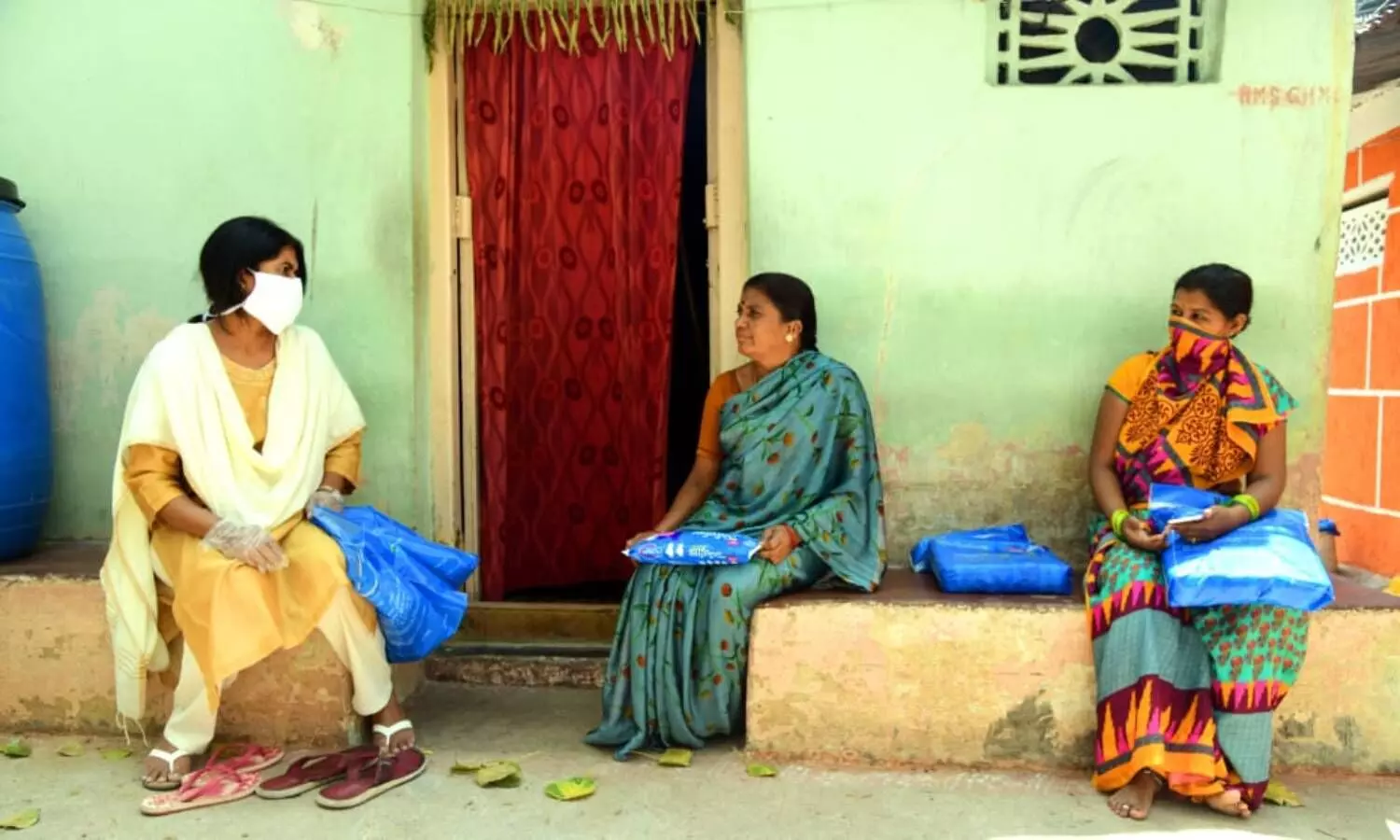Pad Woman: Ayesha Rubina is taking Sanitary pads to women at large
Ayesha Rubina, she rose to the occasion during pandemic and came to the rescue of poor women going through their monthly periods.
By Sumit Jha
Hyderabad: Imagine the horror of going through a menstrual cycle in the middle of a lockdown with shops shut and sanitary napkins in short supply.
This was exactly the situation when the government abruptly announced the lockdown in Hyderabad. The entire focus shifted to feeding people but little did the people realize that women would be hit hard if they are not provided sanitary napkins.
Enter Ahmed Nagar ward corporator Ayesha Rubina. She rose to the occasion and came to the rescue of poor women going through their monthly periods.
"I asked some women how they are managing. Their reply shocked me. They didn't know what to do. They were using unhygienic clothes. It was really painful," said Ayesha Rubina
Pained by the plight of the women, she went to the supermarket to buy napkins. But to her utter shock, the pads were in short supply. She then went around the city to buy as many napkins and distributed them free among the women in need.
"First I thought it was a very unconventional thing to do. Later women from slums started calling me. Sensing the need, NGOs started distributing sanitary napkins along with ration kits. Even during floods, Akbaruddin Owaisi announced that along with the ration kits, sanitary napkins will also be provided to the people," said Ayesha Rubina.
Ayesha Rubina along with several NGOs distributed around 2 lakh sanitary napkins among the needy women.
U.N Sustainable Development Goals (SDGs)
As a corporator, she was expected to concentrate on civic issues like roads, drainage, water, electricity. But being a qualified social worker, she indulged in various activities that were not her responsibility as a corporator.
"I decided to start somewhere. I looked at the U.N Sustainable Development Goals (SDGs) and Ahmed Nagar fit the bill. Twelve SDG's were chosen. We had to accomplish at least 2 to 3 projects, but we came up with 28 projects," said Ayesha Rubin
Ahmed Nagar has a population of nearly 8 lakh people comprising 12,000 households. It is mostly a residential area. It is a mix of old and developed segments.
Under SDGs, Ayesha Rubina focused on gender equality, education and other issues.
Gender Equality
During her campaign, Ayesha Rubina identified the gender inequalities in the area. She also found out that domestic violence was rampant. She collaborated with the US consulate and conducted comprehensive gender equality and domestic violence programme. She organized street plays and meetings at community centers to create awareness.
"We also collaborated with 'My Choice", an NGO for identifying the victims and solving the issues. I also appointed 3 peacemakers who went to different houses and talked about violence," said Ayesha Rubina.
She also set up a women empowerment center where vocational training was provided to 4,000 women and girls. Not only this, she arranged job placement for these women.
"We also conducted workshops for women to sensitize them about their right to vote and improve their political participation. Our target was to promote social, economic, and political inclusion of women in the area," said Ayesha Rubina.
Economic growth
She created a street vending zone to engage around 250 street hawkers. "We helped them in borrowing loans from the government," said Ayesha Rubina.
Most of the Auto Rickshaw drivers in her area used to earn only Rs 200. "According to government rule, they have to be educated. But most of them were illiterate and, they can't get badges to drive an auto-rickshaw. So half of the money they used to give to the traffic or transport department. So we arranged for their education through open schools and also helped many in procuring certificates from the place they got education from,' said Ayesha Rubina.
Education
Not all children in the Ahmed Nagar ward were going to school. Most of the kids were working as child laborers. "The biggest issue in government schools was cleanliness. We tried to improve the infrastructure of these schools. Also, most of the private schools do not acknowledge the Right to Education. So, we tried to implement it in our area and asked 21 private schools to give 10 seats to underprivileged kids. Now around 192 kids are studying in these private schools. Apart from this, we collaborated with NGOs on education and many kids in our ward are getting free education with the help of these NGOs," said Ayesha Rubina.